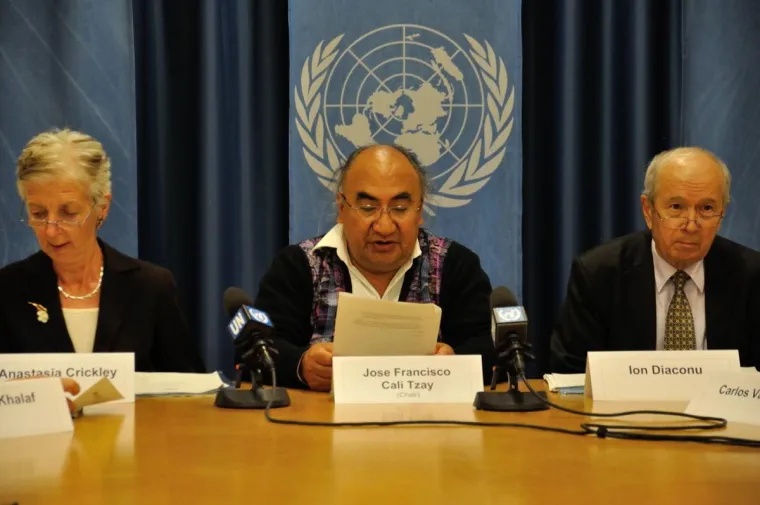
Image courtesy of United Nations
Thanks to the leadership of the University of Arizona Law’s Indigenous Peoples Law and Policy (IPLP) Program, and at the request of the Special Rapporteur, the University of Arizona Law is hosting the United Nations Special Rapporteur on the Rights of Indigenous Peoples José Francisco "Pancho" Calí Tzay for the duration of his three year term as Special Rapporteur.
You can provide vital funding to the Indigenous Peoples Law and Policy Program to support the human rights advocacy work of the United Nations Special Rapporteur (UNSR) on the rights of indigenous peoples.
Upcoming Calls for Input and Consultations
Call For Inputs from the Mandate of the Special Rapporteur on the Rights of Indigenous Peoples for his Report to be Presented at the 51st Session of the Human Rights Council
The Special Rapporteur will devote his next thematic report to Indigenous Women and the Development, Application, Preservation and Transmission of Scientific Knowledge, to be presented to the Human Rights Council at its 51 st session in September 2022. The report will focus on the role of indigenous women as scientific and technical knowledge keepers in the context of international human rights law and identify current threats and challenges that indigenous women face, both internally and externally, for being women and indigenous. The report will provide recommendations for ensuring and protecting indigenous women's ability to develop, apply, maintain and transmit knowledge and propose best practices for State and international support as well as for indigenous women-led initiatives.
Submissions can be made to ohchr-indigenous@un.org by 22 March 2022 in English, French or Spanish. Kindly indicate in the subject of your email "Submission to 51 st HRC session report." Please limit inputs to 10 pages.
Call For Inputs from the Mandate of the Special Rapporteur on the Rights of Indigenous Peoples for his Report to be Presented at the 77th Session of the UN General Assembly
Pursuant to Resolution 42/20 of the Human Rights Council, the Special Rapporteur on the rights of indigenous peoples will dedicate his annual report to the General Assembly on Protected Areas and Indigenous Peoples' Rights: the Obligations of States and International Organizations.
The Special Rapporteur on the rights of indigenous peoples considers it urgent and timely to revisit the issue of protected areas and the rights of indigenous peoples, previously addressed by the mandate in 2016 (A/71/229) and to investigate recent developments with a focus on the obligations of States and international organizations to respect, protect, and promote indigenous peoples' rights and perspectives. The rights of indigenous peoples in the context of conservation and protected areas must be understood and addressed from the particular framework of the UN Declaration on the Rights of Indigenous Peoples and international and regional human rights instruments. These international legal sources recognize indigenous peoples' rights to their traditional lands, territories, natural resources, self-government, self-determination, free, prior and informed consent, and way of life, which form the basis of their collective identity and their physical, economic and cultural survival.
Submissions can be made to ohchr-indigenous@un.org by 22 March 2022 in English, French or Spanish. Kindly indicate in the subject of your email "Submission to 77th General Assembly report." Please limit inputs to 10 pages.
UNSRRIP Calí Tzay’s Role at University of Arizona Law
Students at University of Arizona Law have the unparalleled opportunity to work on Indigenous human rights issues under the supervision of UN Special Rapporteur Calí Tzay. Seanna Howard, Director of the International Human Rights Advocacy Workshop, and her clinic students, provide assistance to Calí Tzay, working on a wide range of research and advocacy projects to support his UN mandate.
Calí Tzay’s role as UN Special Rapporteur is the highest-ranking independent expert appointed by the Human Rights Council with primary responsibility for the promotion and protection of the human rights of Indigenous peoples. Calí Tzay's responsibilities for the three-year post include reporting to the U.N. about global human rights standards for Indigenous peoples, advising the UN and States about best practices to promote these standards, developing studies and reports related to protecting Indigenous peoples' human rights, and responding to specific allegations involving the violation of Indigenous peoples' human rights.
To learn more about UN Special Rapporteur Calí Tzay’s work, including thematic reports, country visits and communications to States please visit the UN Office of the High Commissioner for Human Rights.
Leaders in Indigenous Human Rights Advocacy
This is the second time the IPLP Program has hosted the Special Rapporteur on the rights of Indigenous peoples. S. James Anaya was appointed to the position in 2008 during his time as a College of Law professor and left the U.N. position in 2014.
